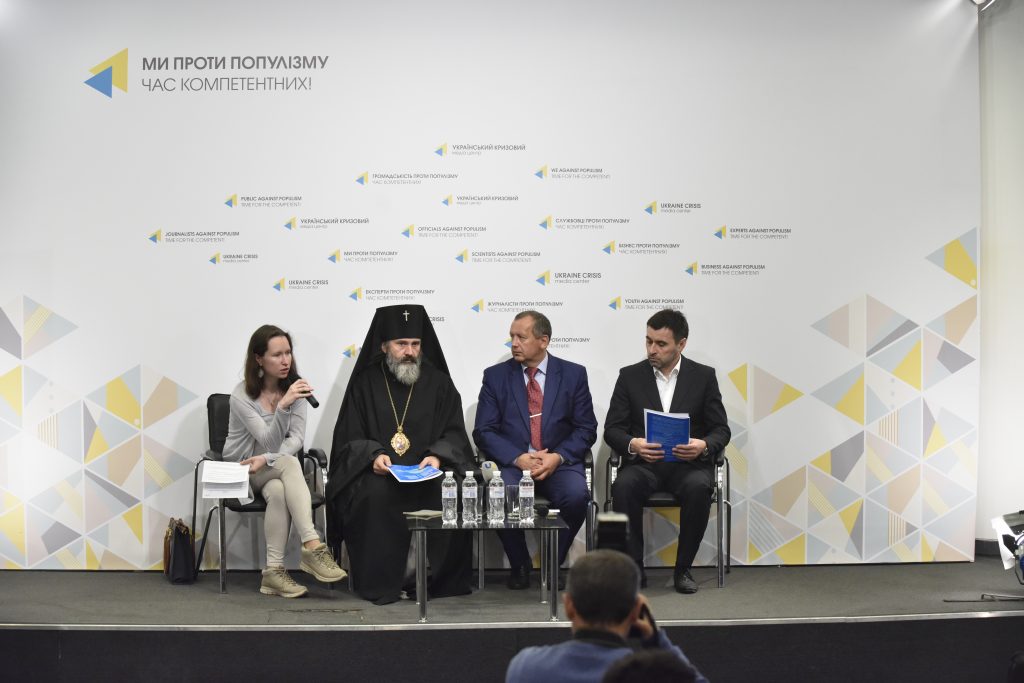Following the provision of autocephaly to the Ukrainian Orthodox Church, attacks of Russian authorities on the UOC-KP in occupied Crimea may intensify. This opinion was expressed by the Archbishop of Simferopol and Crimea Clement at a press briefing in Ukraine crisis media center. “The consultations that I have conducted with Moscow lawyers, whom I spoke to during the trial of Vladimir Baluch, prove that after the adoption of Tomos, there could be more severe actions against the Church of the Kyivan Patriarchate [in Crimea],” he said. According to him, until now attacks on the church by Russian authorities were partially constrained by the fears of mirroring measures against the UOC-MP in mainland Ukraine.
“The UOC-KP in Crimea is not re-registered (according to Russian legislation). It was our principled position,” recalled Archbishop Clement.
According to the results of the study “Crimea without rules. Religious occupation: oppression of the UOC-KP“, conducted by experts of the Ukrainian Helsinki Human Rights Union, the Regional Center for Human Rights and the expert group CHROT, Russian occupation authorities in Crimea create conditions under which the UOC-KP in Crimea cannot continue its activities legally, without abandoning its pro-Ukrainian stance.
38 of the 46 parishes of the Ukrainian Orthodox Church of the Kyivan Patriarchate in Crimea stopped operating in the first year after the occupation. Many religious communities and temples have ceased their activities as a result of indirect actions by Russian authorities, including legal pressure.
“The requirements, established by Russian Federation in order for the church to continue its activities, are incompatible with a [pro-Ukrainian] position: the UOC-KP cannot agree to sign a treaty with the Russian Ministry of Defense, to undergo re-registration under Russian legislation. From the point of view of Russian legislation, the UOC-KP is not even a legal entity. This means that you cannot enter into new agreements, open a bank account, even pay court fees,” said Serhiy Zayets, lawyer and expert of the NGO” Regional Center for Human Rights “. He reminded that in Crimea, the UOC-KP was almost the sole religious community that condemned Russian aggression and called for the defense of territorial integrity of Ukraine.
“Russia is actually trying to eliminate this church in Crimea. It is about physical impediment, intimidation of priests and legal pressure,” said professor of Ukrainian religious studies Oleksandr Sagan.
At least three churches were occupied by Russian authorities – in Sevastopol, Simferopol and the village of Perevalne. In the latter, premises of the UOC-KP were transferred to the UOC-MP, because they entered into an agreement with Russian authorities on “assistance in patriotic education of the military personnel”. In some cases, parishes stopped disbanded because the owners of the buildings that were used for worship left Crimea.
“Now we have 9 places left for worship […]. Out of 25 priests in 2014, there are now 5. Five left just this summer after searches in the Ukrainian Cultural Center, when there were questions about presence of Ukrainians, who did not receive a Russian passport on the territory of Crimea,” said Archbishop Clement. Some priests return for services from mainland Ukraine for 1-2 days, and then go back. According to him, there are 100-150 people, who can be considered permanent parishioners in Simferopol, in Evpatoria – 30-50.
Archbishop Clement noted that as of today administration of the Crimean Eparchy of the UOC-KP filed 4 lawsuits against Russian Federation. “Two deal directly with the Ministry of Defense of Russian Federation, and another two – with property in Simferopol. I will note that courts accept Ukrainian documents and statutes,” he said.
Archbishop Clement also said that he was seriously concerned about health of Ukrainian political prisoner Volodymyr Baluch after the last meeting with him. The attempt to organize a medical consultation for Volodymyr Baluch by an independent doctor and a counseling session about safely stopping the hunger strike has failed. “Everything was legal – under the control of lawyers, with the consent of authority of Simferopol prison. At the consultation Volodya was supposed to be with a lawyer. But 5 of the doctors I turned to have refused. The motivation was this: “We have jobs, we are afraid to lose them.” The only thing I could tell Volodymyr from my own experience – how priests emerge from the Great Lent before Easter, “said Archbishop Clement. He noted that yesterday was the last day, when he could attend Volodymyr Baluch as a public defender.




